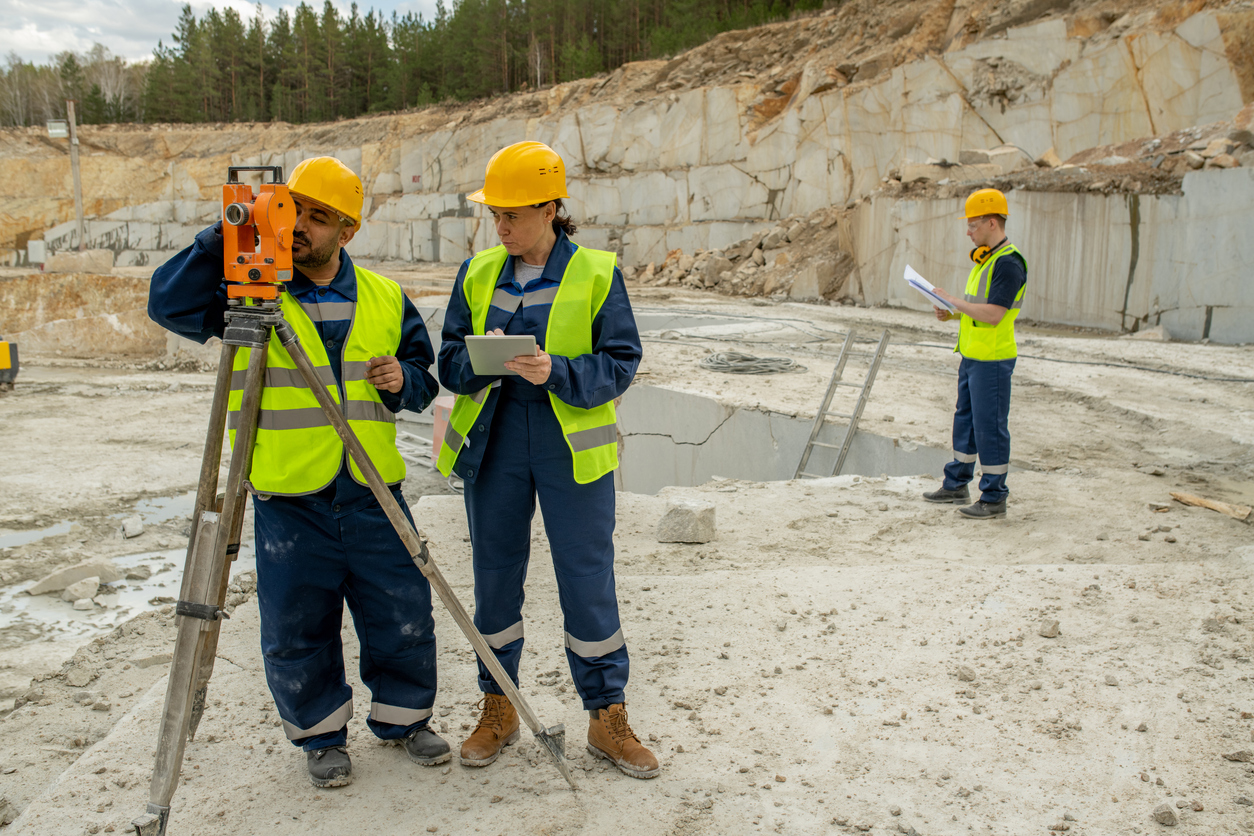The Benefits of Part-Time Construction Jobs: From Scaffolders to Heavy Equipment Mechanics
The Benefits of Part-Time Construction Jobs: From Scaffolders to Heavy Equipment Mechanics
Are you looking to break into the construction industry but not sure if a full-time commitment is right for you? Part-time construction jobs might be just what you need! From scaffolders to heavy equipment mechanics, there are plenty of benefits to working in this field on a part-time basis. In this blog post, we’ll explore why part-time construction jobs can be a great option for those looking for flexibility, experience, and a foot in the door of an exciting industry. Let’s dive in!
Introduction to Part-Time Construction Jobs
Introduction to Part-Time Construction Jobs:
Construction is a growing industry that offers a wide range of job opportunities for individuals looking for part-time work. From scaffolders to heavy equipment mechanics, there are numerous positions available in the construction field that can be worked on a part-time basis.
Part-time construction jobs refer to positions within the construction industry that require employees to work less than full-time hours, typically less than 40 hours per week. These jobs are ideal for those who have other commitments such as school, family responsibilities, or other part-time jobs.
One of the main reasons why people opt for part-time construction jobs is the flexibility it offers. Many individuals struggle with finding a work-life balance and often find themselves unable to commit to full-time employment due to personal obligations. With part-time construction jobs, workers have more control over their schedules and can easily adjust their working hours according to their needs.
Another advantage of taking up a part-time position in the construction industry is the opportunity for hands-on learning and development. Unlike traditional desk jobs, these roles offer practical experience and allow individuals to learn new skills while on the job. Whether it’s operating heavy machinery or working on scaffolding systems, part-time construction jobs provide valuable training opportunities that can lead to career advancement in the future.
Moreover, many entry-level positions in the construction field do not require previous experience or specific education qualifications. This makes it an attractive option for students or those looking for a career change but lack formal training in this industry. By starting off with a part-time role, individuals have an opportunity to gain practical knowledge and decide if they want to pursue further education or certification in this field.
Working in the construction industry also comes with its own set of physical health benefits. The nature of these roles requires workers to be physically active and constantly moving around which helps improve overall fitness levels. Part-timers can benefit from this physical activity without having to commit long hours to a job, making it an ideal option for those looking to stay active while earning an income.
Part-time construction jobs are a great way to enter the growing construction industry and reap numerous benefits. With flexibility, practical learning opportunities, and physical health advantages, these roles offer a perfect balance for individuals looking for part-time work. In the following sections, we will explore some of the specific positions available in this field and their unique benefits.
Overview of Different Types of Construction Jobs Available
Construction jobs are a vital part of the economy and provide employment opportunities for millions of people globally. From building towering skyscrapers to repairing roads, construction workers play an essential role in creating and maintaining the physical infrastructure that we rely on every day. There is a wide range of construction jobs available, each with its unique set of skills, responsibilities, and benefits. In this section, we will give you an overview of some different types of construction jobs available.
1. Scaffolders: Scaffolders work at great heights to build temporary structures that support workers during construction projects. They assemble, dismantle and maintain scaffolding systems using various materials such as metal tubes and wooden planks.
2. Heavy Equipment Operators: These professionals operate heavy machinery such as bulldozers, excavators, cranes, and dump trucks to move earth and other materials on construction sites. They require specialized training and licenses to handle these machines safely.
3. Carpenters: Carpenters construct, install, repair or dismantle the framework for buildings or structures using wood or other materials like steel or concrete. They also create custom-made items such as cabinets or furniture according to blueprints.
4. Electricians: Electricians are responsible for installing electrical systems in buildings by connecting wires to switches, outlets, lighting fixtures, and appliances. They also troubleshoot any issues related to electricity on construction sites.
5. Plumbers: Plumbers install and repair pipes that supply water or gas to buildings while ensuring proper drainage systems are in place. They also install plumbing fixtures such as sinks, toilets, bathtubs based on building plans.
6.Bricklayers/Masons: Bricklayers lay bricks or blocks used in constructing walls while masons use stones or concrete blocks instead of bricks for building purposes.
7.Painters: Painters are responsible for preparing surfaces for painting by removing old paint or filling holes before applying new coats of paint using rollers or sprayers.
8. Welders: Welders use high heat to join metal pieces together in construction sites or manufacturing plants. They work with a variety of materials such as steel, aluminum, and iron.
These are just some of the many construction jobs available that offer part-time opportunities. Each job requires specific skills, training, and experience, making them suitable for individuals with various backgrounds and interests. Whether you enjoy working with your hands, operating heavy machinery or have an eye for detail, there is a construction job out there for you.
Advantages of Working in the Construction Industry
Working in the construction industry can offer numerous advantages, making it an appealing career choice for many individuals. Whether you are a seasoned professional or just starting out, there are several benefits to working in this dynamic and ever-evolving field.
One of the biggest advantages of working in the construction industry is the potential for high paying jobs. With the demand for skilled workers on the rise, companies are willing to pay competitive wages to attract and retain top talent. This means that even entry-level positions can offer decent salaries, with room for growth and advancement as you gain more experience and skills.
In addition to monetary rewards, working in construction also offers a sense of accomplishment and pride. Being able to physically see your work come together and contribute to building structures that will benefit society can be incredibly fulfilling. From constructing homes for families to building infrastructures that improve communities, every project has a tangible impact on people’s lives.
Furthermore, working in construction provides job security. Construction projects often span over months or even years, providing stability for workers who may not have consistent employment opportunities in other industries. As long as there is a need for new buildings and infrastructure maintenance, there will always be job opportunities in construction.
Another advantage of working in this industry is the opportunity for hands-on learning and skill development. In addition to formal training programs offered by employers or trade schools, many construction workers learn on-the-job through apprenticeships or from experienced colleagues. This allows individuals to gain valuable experience while getting paid at the same time.
Moreover, part-time employment options are common within the construction industry. For students or those looking for flexible work arrangements, part-time jobs such as scaffolders or heavy equipment mechanics provide an excellent opportunity to earn income while pursuing other interests or commitments.
Working in the construction industry also allows individuals to develop strong teamwork skills and build relationships with coworkers from diverse backgrounds. Construction projects require collaboration between various tradespeople such as carpenters, electricians, and plumbers. This creates a sense of camaraderie and fosters a supportive work environment.
There are numerous advantages to working in the construction industry. From high paying jobs to job security and opportunities for skill development, it is a rewarding career choice that offers both financial stability and personal fulfillment. Whether you are considering a part-time position or a long-term career in construction, these benefits make it an attractive option for many individuals.
Specific Benefits of Part-Time Construction Jobs
Part-time construction jobs offer a range of specific benefits that make them an attractive option for individuals seeking part-time employment. These benefits include flexible schedules, competitive pay rates, and the opportunity to gain valuable skills and experience in the construction industry.
One of the most significant advantages of part-time construction jobs is the flexibility they provide. Unlike full-time positions, which often require a set schedule with fixed hours, part-time jobs allow for a more flexible work schedule. This can be especially beneficial for individuals who have other commitments such as school or family responsibilities. With part-time construction jobs, workers can choose to work mornings, afternoons, or evenings depending on their availability and preference. This flexibility not only allows for a better work-life balance but also provides opportunities for individuals to pursue other interests or commitments while still earning an income.
Moreover, part-time construction jobs often offer competitive pay rates that are comparable to full-time positions. According to data from the Bureau of Labor Statistics, the median hourly wage for all occupations in the construction industry was $20.92 in May 2020 (1). With many entry-level positions paying well above minimum wage and offering opportunities for overtime pay, part-time workers can earn a decent income while working fewer hours than they would in a full-time position.
In addition to flexible schedules and competitive pay rates, another significant benefit of part-time construction jobs is the opportunity to gain valuable skills and experience in the industry. Many employers are willing to train and develop their employees’ skills on-the-job, making it an ideal option for those looking to break into the field without prior experience. Part-time workers can learn various aspects of construction work ranging from scaffold building techniques to heavy equipment operation methods. These hands-on experiences not only enhance their resumes but also provide them with practical skills that may lead to future career advancement opportunities.
Furthermore, working in the construction industry can also open doors for networking opportunities with professionals from different trades and backgrounds. This exposure can provide valuable connections and references for future employment prospects.
There are numerous specific benefits to working part-time in the construction industry. From flexible schedules to competitive pay rates and the opportunity to gain valuable skills and experience, part-time construction jobs offer a range of advantages that make them an attractive option for job seekers.
Personal Development and Career Growth Opportunities
Personal development and career growth opportunities are crucial aspects to consider when looking for a job. Many individuals want not just a stable income, but also room for advancement and personal growth. Part-time construction jobs offer both of these benefits, making them an attractive option for those seeking employment.
In the construction industry, there is a wide range of roles available that cater to different skill sets and interests. From scaffolders to heavy equipment mechanics, each position requires specific knowledge and expertise. By working part-time in construction, individuals have the opportunity to explore different roles and find their niche within the industry.
One of the main advantages of part-time construction jobs is the hands-on experience they provide. Unlike traditional desk jobs, these positions require physical labor and on-site work. This provides individuals with valuable practical skills that can be applied in various settings. For example, someone working as a scaffolder will learn how to build sturdy structures while adhering to safety regulations – skills that can be useful in other industries such as event planning or stage production.
Apart from gaining technical skills, part-time construction jobs also foster personal development through teamwork and communication. Construction projects involve collaboration between various workers such as builders, engineers, and project managers. This dynamic environment allows individuals to improve their interpersonal skills by learning how to effectively communicate with others and work towards a common goal.
Furthermore, part-time construction jobs offer ample opportunities for career growth within the industry itself. With dedication and hard work, employees can progress from entry-level positions to more advanced roles with higher pay and responsibilities. For instance, someone starting out as an apprentice may eventually become a certified tradesperson or even take on supervisory roles.
Additionally, many companies in the construction industry offer training programs or tuition reimbursement for further education related to their field of work. This means that employees who wish to expand their knowledge or acquire additional qualifications can do so without worrying about financial constraints.
Opting for part-time construction jobs can provide individuals with the chance to develop new skills, enhance personal growth, and advance their career within the industry. These opportunities, coupled with a stable income, make part-time construction jobs a valuable option for those looking for employment. So if you are considering this field of work, rest assured that it offers much more than just physical labor.
Tips for Finding and Landing a Part-Time Construction Job
Tips for Finding and Landing a Part-Time Construction Job
If you are interested in working part-time in the construction industry, there are various tips and strategies that can help you find and secure your desired job. Here are some useful tips to keep in mind:
1. Network with people in the industry: One of the best ways to find part-time construction jobs is through networking with people who already work in the industry. Attend local trade shows, join professional associations, or connect with individuals on LinkedIn to expand your network. These connections may lead to potential job opportunities or referrals.
2. Utilize online job boards: There are many online platforms specifically dedicated to advertising construction job openings. Make sure to regularly check these websites for new listings and tailor your resume or cover letter accordingly before applying.
3. Reach out directly to construction companies: Do not be afraid to approach construction companies directly, even if they do not have any current job postings listed. You can send them your resume and express your interest in working for them on a part-time basis. This proactive approach may impress employers and increase your chances of landing a job.
4. Highlight relevant skills and experience: When applying for a part-time construction job, it is essential to highlight any relevant skills or experience you have that make you stand out as an ideal candidate. For example, if you have previous experience operating heavy equipment or have taken courses related to scaffolding, make sure to mention this in your application materials.
5. Be flexible with schedule and location: Part-time jobs may require flexibility when it comes to working hours and location, so it is crucial to be open-minded about these factors when searching for a position. Consider expanding your search beyond your immediate area if necessary.
6. Have a positive attitude during interviews: Showing enthusiasm for the company and position during interviews can make a significant impact on potential employers’ impression of you as a candidate. Research the company beforehand, prepare questions to ask, and demonstrate your knowledge and interest in the industry during the interview.
Finding and landing a part-time construction job requires effort, persistence, and effective networking. By utilizing these tips and strategies, you can increase your chances of securing a fulfilling part-time position in the construction industry. Remember to always showcase your skills and experience, remain flexible with your schedule and location preferences, and maintain a positive attitude throughout the application process.
Real-Life Success Stories from Part-Time Construction Workers
Construction work is often seen as a full-time, physically demanding job that requires years of experience and specialized training. However, many individuals have found success in the construction industry by working part-time jobs. These real-life success stories showcase how part-time construction workers have not only made a living but also achieved their career goals.
Scaffolder turned Business Owner – John Smith
John Smith had always been interested in constructions since a young age. However, due to financial constraints, he was unable to pursue his dream career. Instead, he landed a part-time job as a scaffolder while studying for his degree in Construction Management.
Through hard work and dedication, John quickly gained knowledge and expertise in the field of scaffolding. After 4 years of working part-time, he saved enough money to start his own scaffolding business while still completing his studies.
Today, John’s business has grown significantly and he is now recognized as one of the top scaffolding contractors in his area. He credits his success to starting off as a part-time worker which allowed him to gain hands-on experience and save up for his business venture.
Heavy Equipment Mechanic turned Engineer – Sarah Johnson
After being laid off from her full-time office job during the recession, Sarah Johnson decided to take on any available work she could find to make ends meet. She stumbled upon an opening for a part-time heavy equipment mechanic at a nearby construction site.
Despite having no prior experience in mechanics or construction, Sarah was determined to learn everything she could about fixing heavy machinery. Through on-the-job training and online courses during her free time, she became proficient at her new role within just six months.
Impressed with her dedication and skills, the construction company offered Sarah a full-time position as an engineer after they completed their project. Today, Sarah works full-time as an engineer at the same company with a much higher salary than her previous office job.
Part-Time Construction Worker turned Contractor – Mark Davis
Mark Davis was working as a full-time accountant when he decided to take on a part-time job as a construction worker to help pay off his student loans. Initially, he found the physical demands of the job challenging but eventually, he fell in love with the work.
With his background in accounting and newfound passion for construction, Mark saw an opportunity to start his own contracting business. He continued working part-time at the construction site while building his business during his free time.
Today, Mark is a successful contractor with multiple projects under his belt and has left behind his accounting job for good. He credits taking on a part-time construction job for giving him the push he needed to pursue his true passion and achieve financial stability.
These real-life success stories demonstrate that part-time construction jobs can lead to fulfilling careers and even entrepreneurship opportunities. With dedication and hard work, individuals can climb their way up from being part-time workers to achieving their career goals in the construction industry.
Conclusion: Is a Part-Time Construction Job Right for You?
After exploring the various benefits of part-time construction jobs, it is important to consider whether or not this type of work is the right fit for you. While there are many advantages to working in the construction industry on a part-time basis, it may not be suitable for everyone.
One of the main factors to consider when deciding if a part-time construction job is right for you is your physical health and abilities. Construction work can be physically demanding and often involves heavy lifting, climbing, and operating machinery. If you have any physical limitations or health concerns that may make it difficult for you to perform these tasks, then a full-time office job may be a better option.
Another aspect to think about is your flexibility and availability. Part-time construction jobs often require workers to have a flexible schedule and be available at various times throughout the week. This can include early mornings, late nights, and weekends depending on the project’s timeline. If you have other commitments such as school or family responsibilities that require a set schedule, then a part-time construction job may not be feasible for you.
It is also essential to consider your long-term career goals when contemplating a part-time construction position. While this type of work can provide valuable experience and skills in the industry, it may not lead to long-term stability or advancement opportunities compared to full-time positions. If you are looking for a stable career with growth potential, then pursuing full-time employment in the construction field could be more beneficial.
Furthermore, working in construction requires individuals to have strong problem-solving skills and adaptability due to the nature of this industry’s projects. Part-time workers must be able to quickly learn new techniques and adjust their approach as needed while working alongside different teams on varying projects. If these characteristics do not align with your strengths as an individual, then pursuing a different type of job would likely yield better results.
While there are numerous benefits associated with part-time construction jobs like flexibility, hands-on experience, and competitive pay, it is important to assess your abilities, schedule, and long-term goals before pursuing this type of work. Ultimately, only you can determine if a part-time construction job is the right fit for you. Consider all factors carefully before making a decision and remember that there are both pros and cons to every job opportunity.








Comments are closed.